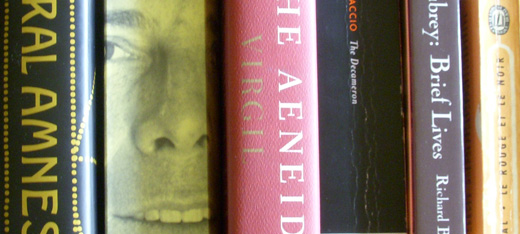Thursday Morning Read
The end is nigh — for this round of books. Three stories in the Decameron, six pieces in Cultural Amnesia (Edward Gibbon is where I came in, so Charles de Gaulle is my exit), and not much more of James Merrill’s A Scattering of Salts or John Aubrey’s Brief Lives.
To be so close to the close of the Decameron makes me feel rather like the Bold Lover on Keats’s Urn.
¶ In the Decameron, a tale straight out of — what? Emily Post? Ann Landers? What’s a pretty and talented middle-class girl called Lisa to do when she falls in love with the king? Here’s what: when the king, impressed by her intelligent handling of the problem (resolving to die, &c), bids her marry an impoverished gent of good family, she says:
And because I was always prepared, from the moment I fell in love with you, to make my wishes accord with your own, not only shall I be willing to accept and treasure the husband you choose to bestow upon me, who will bring me dignity and honour, but if you were to order me to walk through fire, and I thought it would please you, I should do it gladly.
Yeah, right. Well, those were simpler times. Today, Lisa, played by Uma Thurman, would become a dangerous stalker, dissolving all manner of philtres in the king’s goblet.
Boccaccio can be the most unconvincing old toady!
¶ Wasn’t I, only yesterday, regretting that Aubrey omits a life of Serjeant Maynard? Today’s reading brings me the very unexpected life of the other famous Seventeenth-Century legal antiquary, John Selden, a Parliament man with deep aristocratic connections — to the Countess of Kent.
I remember my saddler who wrought many years to that family [Kent’s] told me that Mr Selden had got more by his prick than he had done by his practice. He was no eminent practiser at bar; not but that he was or might have been able enough; but after he had got a sweet ease he chiefly addicted himself to his more ingenious studies and records.
And to think that Victoria was the first patron of the Selden Society!
¶ In Merrill, “My Father’s Irish Setters.” I don’t much care for the breed (not terribly bright-seeming to me, although I realize that the canine intelligence effect is all smoke and mirrors). The poet’s description, however, is beautifully exact:
Began a joyous barking,
A russet-and-rapid-as-flame
Leaping, then whimpering lickings
Of face and hands through wire.
Like fire, like fountains leaping
With love and loyalty…
¶ Clive James on W C Fields. Every time I’m confronted with the sight of writhing naked lovers in the movies, I long for the old Production Code, which made it all look so much sexier with cigarettes. As James points out, the Code pressed some veins of comedy into diamonds like My Man Godfrey (his choice) and The Palm Beach Story (mine). But not all:
For Fields, especially in his later years, being suggestive about sex was at the heart of spech, because the discrepancy between his raddled body and his intact lusts was the secret of his screen personality. All his best dialogue came from a mental underworld of sensual indulgence. Hence we have to live with the cruel paradox that sound movies silenced him.
Not a Fields fan by any stretch, I didn’t know the line about losing the corkscrew in Afghanistan…

